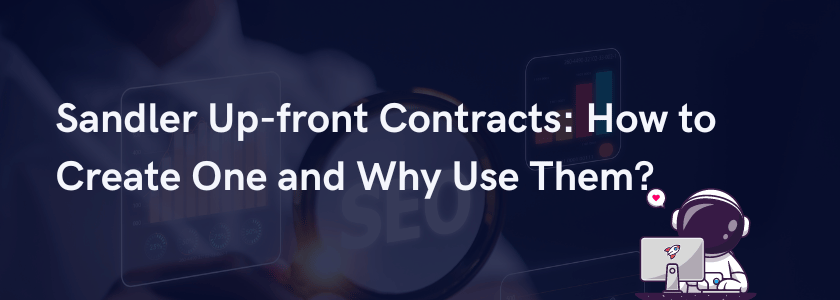An up-front contract can help set the foundation of mutually-beneficial relationships where shocking surprises don’t exist. While others appreciate and find surprises to be fun, they are not as pleasant from a professional perspective, wherein deals with a prospective client takes place all the time.
Surprises that occur during a meeting prove to be instant deal breakers, or at the minimum, can compromise a healthy relationship between a company and its prospects. Just imagine a dentist pulling a tooth out of his patient as a surprise. To say that it’s a mortifying experience would be a gross understatement.
Fortunately, there’s a vital tool in the Sandler Selling System that businesses can utilize to avoid this pitfall — Up-front Contracts (UFCs).
What is the Sandler Up-front Contract?
“No mutual mystification” is a part of David Sandler’s core rules, and his method of using UFCs reflects just that. These contracts serve as an assurance that all parties involved understand what will occur in a meeting before the actual meet-up even begins.
Aside from eliminating unpleasant surprises, a UFC allows sales professionals to maintain control in every aspect and phase of the selling process. It’s common knowledge that taking control during the selling process is crucial to sales professionals’ success. If they cannot take control or lose it along the process by letting prospects or clients take the reins (which paves the way for the introduction of unexpected elements), following the Sandler method effectively to close the sale becomes difficult, if not impossible.
On the other hand, if sales professionals establish a UFC beforehand, they can guide their client interactions with confidence while staying on track with the sales process.
How to Create an Upfront Contract?
A Sandler upfront contract includes five elements:
- Purpose of the meeting – Apart from answering the question, “what is the purpose of the meeting?” both parties should also know why they’re meeting in the first place. The purpose of the meeting should also indicate anticipated future actions and deliverables.
- Prospect’s Agenda – answers the questions, what is the prospect looking to achieve in this meeting, what are his expectations for the seller, and what would make the meeting great or interesting?
- Salesperson’s Agenda – what is the salesperson’s agenda, and what information should the prospective client need to provide to come up with a mutual decision on the best possible solution to the prospect’s concerns.
- Time – how much time do both sides have, and do they have enough time to cover all points necessary to arrive at a conclusive resolution?
- Outcome – the expected overall outcome for the meeting. This result will dictate the decision to either stop (if the sales professional and prospective client agree that they are not a good match) or proceed to the next steps that are agreeable for both sides.
How to Put the UFC to Use?
Before the meeting, it’s essential to ensure that the prospective client understands and agrees to the UFC terms. The sales professional shouldn’t forget to review the agreement with his prospective client before leaving the office or hanging up the phone.
The salesperson does not have to tell his prospect, “Hey, let’s make a UFC.” They only need to include the five points in the email or phone conversation before finalizing the meeting details.
Here, the benefits of a UFC, like the Sandler upfront contract, are clear. Setting an agenda for each meeting will ensure that there’s a result that both parties will do their best to achieve. Also, the salesperson has the opportunity to ask relevant questions to advance the sale, and in the process, overcome objections that may arise. Perhaps the most important benefit, however, is for both sides of the table to get a clear opportunity to see and express each other’s opinions about places in the sale that don’t fit, among other things.
Finally, after each meeting, the salesperson should send out a summary that documents all the points and next steps discussed. Putting everything into writing helps put a structure to the subsequent meetings and interactions that will follow.
UFC Breach
Since a positive outcome isn’t expected all the time, a sales professional must know what to do if the prospect decides to renege on their original agreement. After determining the prospect’s reason for breaching the UFC, they should decide whether to proceed with the meeting under new conditions, reschedule with a new UFC, or end the relationship right there.
It can’t be emphasized enough how crucial an upfront contract is in using the Sandler Selling System. Making this contract and sticking to it provides every sales professional the ability to focus on their prospects’ specific needs while maintaining control of the selling process and be a step closer to securing the deal.
For more helpful tips you can apply to your business, visit our website.





